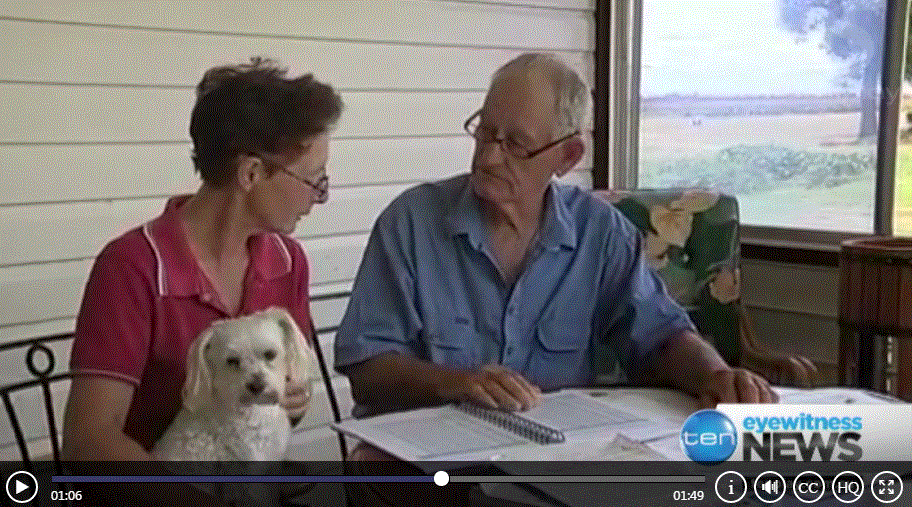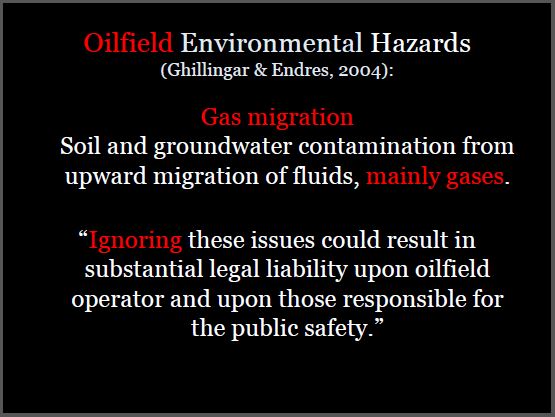George Bender’s family shares their grief with the world 1:49 Min by msn.com
Chinchilla community mourns loss of local farmer by Alana Calvert, October 23, 2015, The Chronicle
THE Western Downs community is grief-stricken with the tragic passing last week of local farmer George Bender.
Mr Bender died on Wednesday night, October 14, leaving behind his wife Pam, their five adult children as well as many grandchildren and great-grandchildren.
On Monday night, Mr Bender’s family and friends came together to honour him at a small memorial service at Chinchilla Catholic Church Hall and to offer one another support.
Local Minister of the Uniting Church and close friend of the Bender family, Reverend Graham Slaughter, led the short service in which mourners were given a chance to share the ways in which Mr Bender had touched their lives.
Neighbour and friend of Mr Bender’s, Shay Dougall had prepared a short speech but, as emotion overwhelmed her, Rev Slaughter stepped in to read it.
“George, I am so very proud I got to know you. I am so proud my children got to see what a real Australian looks like,” Rev Slaughter read out on Ms Dougall’s behalf.
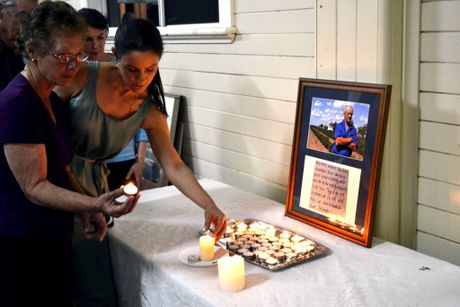
George Bender’s wife Pam and daughter Helen light candles at his memorial service on Monday night. Photo Alana Calvert
Mr Bender’s youngest child and only daughter, Helen Bender, made a special statement to those who had attended the event, which included representatives from some of the major news stations, in which she spoke of her father’s passion for the land he had spent his life farming.
“Whether he was playing sport, coaching youngsters, judging at the local agricultural shows, or simply giving those in need some help and advice, George’s contribution to agriculture, the community and his family was part of what made him a well-known and highly regarded pillar in the Western Downs area,” Ms Bender said.
Ms Bender said her father was one of five generations who had farmed in Chinchilla since 1907, and he had passed the knowledge and skills of agriculture on to his children, three of whom had continued the tradition of making livelihoods from the land.
“Integrity is the word most often associated with George, both before and after his death,” she said.
“In the way he farmed, the quality of his produce was never compromised, and nothing would be sold, sent to market or shared with others unless it was of the highest quality.”
Tributes flooded in over social media from the local community and from strangers who had heard of the tragedy.
“Mr Bender, you were a great man. I cherished the days we had when I played cricket with Colts Cricket Club. Great memories. Always seen you there having beer with my pop. RIP, you were a great man,” Malone Nathan wrote on the Chinchilla News’ Facebook page.
Brenda Rackemann wrote: “Our thoughts and prayers are with you Pam, your children, grandchildren and great grandchild. George will be remembered for being an honest hard man trying to do the best he could for his family.”
Local couple Lyn and Daryl Bein also expressed their grief over Mr Bender’s death: “Shock(ed) to hear of George’s passing. We will miss you. (You) stood up for what was right. Great bloke. Condolences to Pam and her children and the whole Bender family.”
George Bender was one of five generations of Hopeland farmers who had made their livelihoods from the land since 1907.
Vigils for Mr Bender were held around the country last night.
George Bender will be put to rest following a service at Chinchilla Catholic Church on Saturday.
Family, friends and acquaintances of Mr Bender are invited to attend the service which will begin at 11am.
If you or someone you know needs help or someone to talk to, please contact Lifeline on 13 11 14. [Emphasis added]
Darling Downs community pays tribute to anti-CSG farmer who ‘died from a broken heart’ by ABC News, October 19, 2015
The Darling Downs community of Chinchilla has come together to pay tribute to a farmer who took his own life after a long fight against the coal seam gas (CSG) sector.
Western Downs landholder George Bender died last week.
He had spent years fighting against CSG in the region and was involved in a long-running dispute with resources companies, one of which reportedly wanted to put 18 wells on his farm near Chinchilla.
A community meeting on CSG has been held in Chinchilla and attended by members of Mr Bender’s family.
It was run by two representatives from the Sisters of Mercy who were there to support the community in dealing with their grief.
His daughter, Helen Bender, said her father “died of a broken heart”.
“He fought to protect the air, land and water from the inevitable permanent damage that this industry is causing and has caused overseas,” Ms Bender said.
“His struggles were not just for himself and his family, but for the whole country that depends on the agricultural and environmental resources unique to the Western Downs area.
“He was prepared to fight for what he truly believed in and call others to account.
“The tragedy is, in fighting for his country, his struggles are now his legacy, but it is the determination of those who have known and loved George Bender that his sacrifice not be forgotten.”
In a statement, Ms Bender said her father “did not suffer from depression or mental health issues”.
“These issues, although important in their own right, cannot be allowed to detract from the real concern in this case, which is the effect of the CSG industry on the lives of farmers and the environment,” she said.
“It was a sudden and unexpected act that caused George to take his own life. His family is, and always has been, close and supportive.
“Farming is a stressful occupation but what is not recognised is the additional and unrelenting burden that having to deal with the CSG industry has on the lives of those families affected.”
Last week, Queensland senator Glenn Lazarus said he was “gutted” by Mr Bender’s death.
“Not only does this community have to live with this scourge of CSG coal seam gas mining on a daily and nightly basis, now they have to deal with one of their most-respected and most-loved community members taking his life,” Mr Lazarus said. [Emphasis added]
QLD farmer commits suicide after decade long battle against coal seam gas by Joanna Robin, October 17, 2015, mamamia.com
Independent Senator Glenn Lazarus is leading calls to change coal seam gas mining laws and introduce a royal commission into the human impact of the industry after the suicide of well respected Queensland farmer.
On Wednesday evening, cotton farmer George Bender took his own life after more than a decade of fighting resource companies planning to build CSG wells on and around his Chinchilla property.
Bender was one of the first farmers in his area to take a stand against CSG practices after they damged his underground water bore.
His death has prompted calls for a formal investigation into the human impact of CSG and large mining projects by Independent Senator Glenn Lazarus.
Speaking on Macquarie Radio this morning, Lazarus said he was “gutted” by the loss.
“These mining companies are bullying, they’re berating, they’re threatening these people on a daily basis,” he said.
“We’ve brought these hard-working, hard men to tears they’re just so frustrated they have nowhere to go, they have no-one to back them up.”
Lazarus also accused the Queensland government of failing to support farmers impacted by CSG and renewed calls for a Royal Commission.
“Let’s just take a deep breath and put a pause on CSG mining projects until we can establish the human and environmental impacts,” he said.
“What really gets me so frustrated is the governments of the day just don’t care what they’re doing to Australians and Queenslanders … just honest hard-working people that want to work the land.
“They’ve given them no rights to say ‘no’ and they just don’t care that these people are living in an absolute nightmare and they don’t care because these governments are being given donations.”
… In Sydney on Friday, Prime Minister Malcolm Turnbull described Bender’s death as a “shocking tragedy”. He said that he was “looking into it”, but elaborated that the issue of mineral exploration rests largely on the states.
State issue or not, Lazarus said he would be putting pressure on Federal Parliament and knocking at the door of newly appointed Resources Minister Josh Frydenberg.
Meanwhile, the Federal Government has just re-approved the controversial Carmichael coal mine despite ongoing concerns from environmental groups and the Queensland farming community.
Environment Minister Greg Hunt gave it the green light on Wednesday, essentially ignoring potential risks to endangered species and precious groundwater resources in the area.
At present, Queensland farmers are committing suicide at twice the rate of the rest of Australia.
If you find yourself in need of help, for any reason, crisis support is available through Lifeline on 13 11 14.
Coal Seam Gas Protestors Picket Energy Meeting After Farmer George Bender’s Death by Josh Butler, October 21, 2015, Huffingtonpost.com
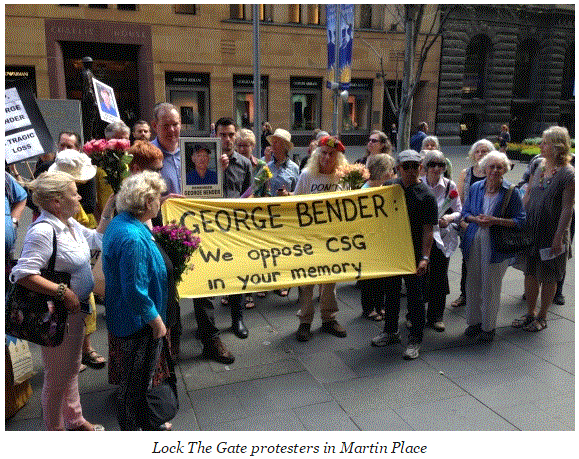
Anti-coal seam gas group Lock The Gate has picketed the annual general meeting of Origin Energy in Sydney in the wake of the death of anti-CSG campaigner and farmer George Bender.
Around 50 people gathered outside The Westin Hotel in Martin Place on Wednesday morning, brandishing signs and banners opposing the practice of gas companies forcing farmers to allow CSG wells to be placed on their properties.
…
Phil Laird, National Coordinator for Lock the Gate, told The Huffington Post Australia laws in Queensland heavily favoured gas companies and left farmers with little choice but to allow their lands to be drilled.
“George was involved with four different companies over the years who were trying to get access to his land. He denied them access because he looked at the environmental impacts and found them unacceptable,” Laird said.
“[The companies] find the farmer or landholder, try and get access to the land and try to sign an access agreement. If the farmer rejects that the company can — particularly in Queensland — threaten to take them to the Land Court, then they have 28 days to come to an agreement or the company can get access.”
“It’s a gun to your head.”
Laird said laws needed to change to better protect farmers and land, calling current rules “unacceptable”.
“There should have the right to say no. It’s your land, you have to deal with the impacts,” he said.
A City of Sydney council ranger moved the group on from their initial position in Martin Place. The protesters then lined up outside the entrance to the hotel on the opposite side of the building, before then attracting the attention of police. A man with a guitar sang protest songs as the group — banners and placards in hand — lined the front of the hotel, aiming to speak to those attending the Origin meeting.
Lock The Gate also launched an eight-point document targeting the Queensland government, saying farmers and landholders needed better protections against gas companies. The proposal includes amending laws to allow landholders to deny gas companies access to their properties, placing an immediate halt on further plans to drill CSG wells in the Hopeland area of QLD, for the government to step in and broker buy-out deals for several families in the Chinchilla area, establish a CSG Family Crisis Panel and a dedicated counselling and support service for CSG affected communities, and to invest in more research around the health impacts of CSG.
Senator Glenn Lazarus, who has previously spoken of being “gutted” at news of Bender’s death, will on Thursday speak at another Lock The Gate protest. The group is planning to picket the Queensland premier’s office in Brisbane and the Origin Energy office in Melbourne from 4.30pm.
“”These mining companies are bullying, they’re berating, they’re threatening these people on a daily basis,” Lazarus said on Macquarie Radio.
“[Companies have] given [farmers] no rights to say ‘no’ and they just don’t care that these people are living in an absolute nightmare and they don’t care because these governments are being given donations.”
Origin’s Chairman offered his condolences to Bender’s family in his opening remarks at the AGM.
“On behalf of the company, I want to offer my sincerest condolences to the family of Mr Bender,” he said.
“There is some suggestion that industry activity in the region may have in some way contributed to the circumstances surrounding his tragic death.
We are confident that Origin conducts its business with respect and in line with our commitments to farmers and the communities in which we operate.” [Emphasis added]
Vigil for George Bender held at Origin Energy’s Annual General Meeting by Ben Hagemann, October 21, 2015, australianmining.com.au
A vigil has been held today at the Origin Energy AGM in Sydney to commemorate Western Downs farmer and anti-fracking campaigner George Bender.
A number of community members from Chinchilla and the Western Downs have attended the Origin AGM to ask questions about the company’s involvement with George Bender.
Mr Bender took his own life one week ago, on October 14, after a decade of battling against coal seam gas companies.
The Chinchilla local was well-known for his stance on long-term sustainable agriculture, and in recent years for his opposition to companies operating in the Surat Basin, including QGC, Origin Energy and Arrow Energy.
Mr Bender’s Hopeland property is within the exclusion zone affected by Linc Energy’s coal gasification plant, which allegedly caused extensive gas pollution to soils in the area south of Chinchilla.
The Bender family has also been involved in legal battles relating to draining of two bores on their property, and had resisted offers of compensation for the drilling of 18 wells by Origin Energy.
Today at the Sydney vigil Lock the Gate Alliance spokesman Phil Laird described Mr Bender as an “exeptionally brave and honest man and a wonderful farmer”.
“George will be a remembered as a warm man who loved working the land, loved his community and asked for nothing more than to quietly grow food and fibre for Australia,” Laird said.
“George fought long and hard to defend his property and neighbours at Hopeland on the Western Downs from the impacts of CSG.”
“George was under extreme pressure from Origin Energy who are expanding their CSG gasfield near Chinchilla.
“They wanted to drill 18 gas wells on George’s property even after two of his bores ran dry. They had threatened to take him to the Land Court.
“The Hopeland community have been vocal in their opposition to CSG and earlier this year had declared themselves Gasfield Free.
“We’re holding this vigil outside the Origin AGM today to honour George and to say “never again”.
Senator Glen Lazarus, who was well acquainted with Mr Bender, said last week that the coal seam gas industry had “blood on their hands” for the way companies had bullied and harassed Mr Bender over a number of years.
Lazarus has called for a moratorium on CSG exploration and production in Queensland, and said he would “ensure that Australia sits up and takes notice of what is happening to the people of Australia affected by coal seam gas mining”.
The independant senator last week released a seven point plan for CSG mining which included calls for government assistance with the costs of George Bender’s funeral, for the establishement of a Royal Commission into the human impact of CSG exploration and production, for a halt to all CSG approvals, and for the establishment of a CSG commissioner.
Vigils to honour Mr Bender and pay respects to his family will also be held at the office of Queensland premier Annastacia Palaszczuk on Thursday 22 October at 4:30pm, and the offices of Origin Energy in Melbourne and Adelaide.
*** MUST READ ***
The Bender Family released the following statement on Monday 19 October:
THE LATE GEORGE BENDER
George Thomas Bender was born on 12 June 1947, and spent his life as one of 5 generations of Benders who have, since 1907, farmed in the Chinchilla district. In an area renowned for its prime agricultural land, George was raised and educated in the knowledge and skills of farming from his family, which he in turn passed on to his own children.
With his wife Pam, George raised 4 sons and a daughter on the same property, and in the same house, in which he was raised. Three of those sons have continued farming on the family properties and other lands in the Chinchilla area.
Whether he was playing sport, coaching youngsters, judging at the local agricultural shows, or simply giving those in need some help and advice, George’s contribution to agriculture, the community and his family was part of what made him a well-known and highly regarded pillar in the Western Downs area. As a farmer, George’s commitment to sustainability and innovation saw him willingly assist agricultural research, by supporting cropping trials for various private and Government organisations on his land. The need to undertake and develop more sustainable and productive agricultural practices underscored significant changes and investments in his farming methods over his working life.
“Integrity” is the word most often associated with George, both before and after his death. In the way he farmed, the quality of his produce was never compromised, and nothing would be sold, sent to market or shared with others unless it was of the highest quality. The fact that he won local awards for his wheat, cotton and pigs are examples of this.
It was George’s commitment to “clean and green” produce and long term sustainable agriculture that caused him to carefully examine the claims of CSG companies when they arrived 10 years ago. George questioned the environmental claims of this industry and the right of CSG companies to impose on the lives and activities of the landholders in the Chinchilla and Hopeland areas. He refused to enter into compensation agreements with these companies, notwithstanding enormous pressure to do so. He advised others against the same, but unfortunately witnessed the impacts on the environment and lives of a number of his neighbours as fracking commenced, wells were constructed, pipelines and other infrastructure were built.
Over the last decade, George stood up to a number of big Gas companies, including QGC, Arrow and Origin. In George’s view, all had the same intent and agenda: their interest was in getting the gas and they didn’t really care about the lives of the farmers on whose land they would trample to access it. Throughout Australia, even though you buy or own land, it is the Government who controls the right to minerals beneath the surface. However, once the Government sells the rights to large companies, often from overseas, to extract these minerals, neither the farmer nor the land owner has the right to prevent the impact to the surface of the land, and other vital environmental resources such as water and soil quality. George stood for, quite simply, the right for a farmer to say “no”.
George was a straight talker, often of few words, who, as described by one son, “told the truth, not the sugar coated bullshit”. He was willing to talk openly to anyone who was interested in really seeing what was happening as a result of the CSG industry. He was tenacious in contacting Government departments, company officials and in making himself available to the media, often at significant personal cost. It is fitting that a small amount of his work can still be viewed by the public online in media reports about the cause of Western Downs farmers. He pointed out, to those who had the privilege of his company, in simple and straightforward terms, that the companies stand to make large profits from the mining of these gas resources. In doing so, there are short-term booms but long term destruction to the land and water resources that are of much greater long term value than the profits dispensed to a few shareholders, or the votes courted by a few politicians. There were many politicians, both at a state and federal level, who heard from George. He demanded from our politicians a higher standard. The litany of letters that were left unanswered and telephone calls not returned reflects the political inaction and unwillingness to look at the impacts of this industry by all except the likes of Glenn Lazarus and Larrisa Waters. In a submission to the ‘Senate Inquiry to Investigate Certain Aspects of Queensland Government Administration related to Government Affairs’ in November last year, George stated: The government has provided the CSG Companies with all the power, leaving an individual farmer to protect himself against multinational companies. The decision whether or not to have CSG on our property should be a commercial decision; it should be the right of the farmer to choose what effects his business on a commercial basis. This situation the government has created leaves the process open for bullying, and intimidation and potential corruption.
George, like many farmers of his generation, left school early to support his family working on the land. However, despite the lack of formal education, this did not prevent George spending many hours, night after night, studying the relevant legislation and correspondence from the companies he was standing up to. This led, in the view of many, to George having a better understanding of the relevant law than many others, including company executives and lawyers. He called many to account, in the companies, Government and the community, for their lack of due process and honesty in claims about the CSG operations.
What became clear as regards the Environmental Authority issued in respect of the Origin tenement affecting George’s land, as well as others in the area, is that it was issued without the correct procedures being followed under the Environmental Protection Act. Critical “environmental values” information required to enable environmental impact assessments prior to approvals was never submitted. This pattern has enabled the companies to respond to criticisms by pleading a lack of available data in order to measure impacts, such lack being a result of misfeasance by those who had the responsibility to make sure that legislative procedures were followed.
Since 2005, George confronted and stood up to QGC, Arrow and most recently Origin in them seeking to construct a number of wells on one of his properties. It is from this land that George had over the years grown and harvested a number of award winning crops. The impact of CSG on neighbouring properties had caused his bores to run dry and bubble with noxious methane, something that was not caused by anything other than the mining activities in the area.
The threats most recently from Origin can be simply stated as follows: you agree to our terms or we enter a process that, should you resist, inevitably ends up in Court.
In 2011, George raised concerns about the impacts of the UCG (Underground Coal Gasification) arising from the operations of Linc Energy in the Hopeland area.
The response from Peter Bond, CEO and Managing Director of Linc Energy, was to deny all such claims and a direct threat to have George Bender declared “a vexatious complainant and/or commence legal action for damages for injurious falsehood”.
It is notable that the property on which George was raised and lived until his untimely death is now within an exclusion zone imposed by the Department of Environment and Heritage Protection as a result of investigations into Linc activities. These investigations form the basis of a criminal prosecution against Linc, now before the Courts, for causing serious environmental harm. Notwithstanding the potential impacts of this on the farms and livelihoods of the many landowners in that area, a request on behalf of George Bender and other’s in the affected area to the Department of Environment and Heritage Protection for documents and information pertaining to this matter was denied.
George Bender, in his role to raise awareness and assist others affected by the CSG industries, questioned the independence and viability of the Gas-fields Commission and the commissioners. In that context, George considered it ironic that this publically funded body were not capable of properly fulfilling their publically mandated role.
Much has already been said about George Bender in the media since George took his own life last week. A local gasfields commissioner has sought to link George’s death to the issue of mental health and depression in rural areas. Whilst George’s family recognise that this is an important issue that must continue to be raised and addressed, and something that touches many in the farming community, it must be emphatically stated that George did not suffer from depression or mental health issues. These issues, although important in their own right, cannot be allowed to detract from the real concern in this case, which is the effect of the CSG industry on the lives of farmers and the environment.
It was a sudden and unexpected act that caused George to take his own life. His family is, and always has been, close and supportive. Farming is a stressful occupation but what is not recognised is the additional and unrelenting burden that having to deal with the CSG industry has on the lives of those families affected.
From the time the companies took an interest in George’s land, it is something that the Benders have lived with daily.
It is a constant source of worry, concern and something that you cannot forget.
George saw the impact on families who entered into agreements with CSG companies. He saw the impacts on the land, both agricultural and otherwise, of the mining operations. He did not hold back in trying to bring to light the very obvious effects and impacts of this industry, which were in turn, and routinely, denied by the companies and the Government. The answer that you cannot prove any negative impacts because you do not have the expensive scientific reports did not satisfy this man of the land who had witnessed first-hand the effects.
The issues confronting farmers affected by CSG mining creates differences of opinion within families and communities. These differences of opinion can then become divisions within families and communities. George witnessed this firsthand in those around him, and commented upon the manner in which he viewed CSG companies as being adept at creating and exploiting such divisions.
In the end, George Bender died from a broken heart, at witnessing first-hand the tragedy unfolding around him.
He fought to protect the air, land and water from the inevitable permanent damage that this industry is causing and has caused overseas.
His struggles were not just for himself and his family, but for the whole country that depends on the agricultural and environmental resources unique to the Western Downs area. He was prepared to fight for what he truly believed in and call others to account. The tragedy is, in fighting for his country, his struggles are now his legacy, but it is the determination of those who have known and loved George Bender that his sacrifice not be forgotten.
Throughout his struggle, George took it to the politicians and the company executives, but never criticised the workers in the community who were doing their jobs. Many in the community are now mourning the loss of the person they could approach and talk to about their problems with the industry, someone who would listen and support them.
There will be many eulogies in honour of George Bender over the coming days. The family requests that the media respect their privacy and grieving at the funeral later this week.
The Bender Family
Hopeland
19 October 2015
[Refer also to:
Environmental hazards posed by the Los Angeles Basin urban oilfields: an historical perspective of lessons learned by G.V. Ghillingar and B. Endres, received November 28, 2003, Accepted August 9, 2004, Published online October 26, 2004 in Environmental Geology (2005) 47:302-317
Slide from Ernst presentations
2005/06 Industry: “….industry still has much to learn about hydraulic fractures. Fractures from both horizontal and vertical wells can propagate vertically out of the intended zone, … potentially connecting up with other hydraulic fracturing stages or unwanted water or gas intervals.”
2006 Regulator: “Information provided by industry to date shows that there may not always be a complete understanding of fracture propagation at shallow depths and that programs are not always subject to rigorous engineering design.”
2008 Industry: “We Can Safely Say That We Know Everything There Is To Know About Hydraulically Created Fractures EXCEPT How Deeply They Penetrate; Their Vertical Extents; Their Symmetries About the Wellbore; Whether They Are Planar or Multi-stranded; Their Geometries At The Perimeter; Which Directions They Go; What Their Conductivities Are”
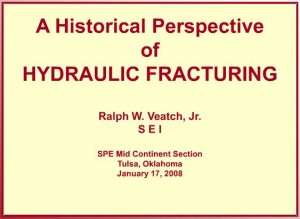

2009 12 23: Derek Ernst, 23, nephew of Jessica Ernst, takes his life.
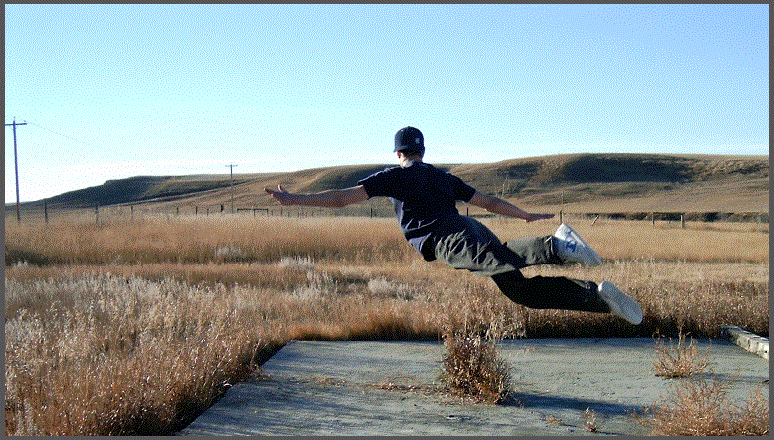
2005: Derek practicing martial arts at Rosebud a few months before he and his Auntie Jess discovered their water was dangerously contaminated and explosive with methane.
The previous year, Encana had illegally fractured the aquifers that supply the Ernst water well and others in the community. Not much but cover-up and fraud since, by Encana and the “Best in Class” AER, the Alberta Energy Regulator.
2010 Regulator: “Fracture propagation via large scale hydraulic fracturing operations has proven difficult to predict. Existing planes of weakness in target formations may result in fracture lengths that exceed initial design expectations.”
2010 02: As Schlumberger Chairman and CEO Andrew Gould said during a conference call with investors Monday:
“we’re doing it by brute force and ignorance.”
2011 08 03: Australian Petroleum Association: Coal seam damage to water inevitable
The coal seam gas industry has conceded that extraction will inevitably contaminate aquifers. “Drilling will, to varying degrees, impact on adjoining aquifers,” said the spokesman, Ross Dunn. “The intent of saying that is to make it clear that we have never shied away from the fact that there will be impacts on aquifers,” Mr Dunn said.
2011 08 27: United States Geological Society: “We’re only starting to learn” about fracking, fluid injection, earthquakes
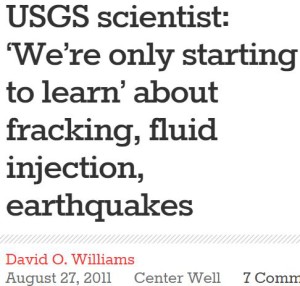
2012: Migration of Gas from Oil/Gas Fields by J. O. Robertson, G. V. Chilingar, L. F. Khilyuk & B. Endres, Available Online June 7, 2012, Energy Sources, Part A: Recovery, Utilization, and Environmental Effects, 34:15, 1436-1447, DOI:10.1080/15567030903077899
2013 02 19: AER (ERCB) lawyer Gary Perkins’ angry bullying letter in response to Stew Shields FOIPing for records on frac’s gone bad in Alberta:
“potentially in the order of millions of pages of records.”
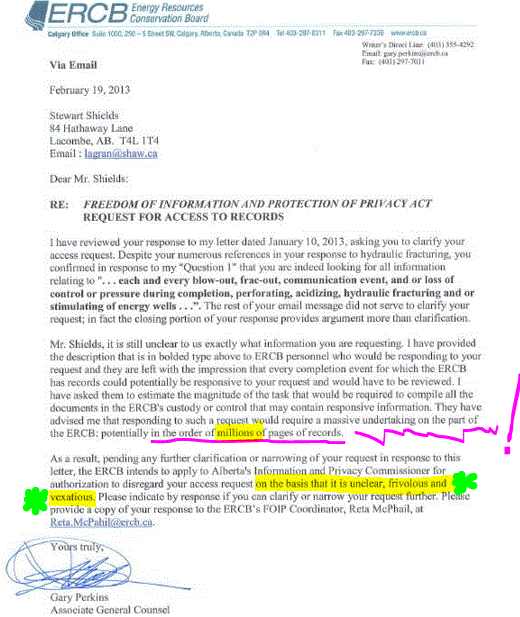
2015 03 15: Gases found in soil
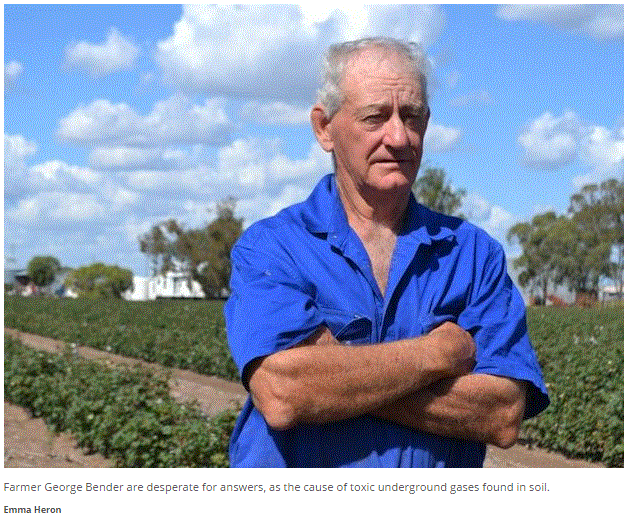
HOPELAND farmers George and Pam Bender are desperate for answers, as the cause of toxic underground gases found in soil near their property remains clouded.
The Department of Environment and Heritage Protection wrote to landowners in the Hopeland area last week informing them gases such as carbon monoxide had been identified in the soil at depths below 2m at a number of locations.
Landowners inside a 312sqkm “excavation caution zone” were advised to contact the department prior to any excavation activities that may occur 2m or deeper.
The Benders’ 647ha (1600-acre) property on Archers Crossing Rd is right in the heart of the designated zone.
“We don’t know whether the gases are in the underground water and we don’t know whether they’re in the dam water,” Mr Bender said.
“Of course we’re worried, until they can find out what’s going on.”
The government described the gases as “combustion by-products” which were not associated with coal seam gas development.
The gas investigation has, however, been linked to Linc Energy, which ran an underground coal gasification pilot project in the area for several years before the project was closed in 2013.
The UCG and CSG industries use different extraction processes.
Linc Energy is currently in a legal battle with EHP after it was charged with “significant environmental damage” last year.
… EHP director-general Jon Black said his department could not rule out that an underground fire was the cause of the gases being present in the soil.
Mr Black said more than 40 EHP staff and specialist consultants were involved in testing in the area. [Who pays for that?]
Queensland Health said there was no current threat to health. [Like Alberta Health, Alberta Energy, Encana say there’s no health harm from deadly toxic sour gas?]
An EHP representative said the excavation caution zone would remain “for the immediate future” until investigations were completed.
Mr Bender said the uncertainty was affecting his day-to-day farm work, describing the issue as a “complete disaster”.
“What happens if a farmer wants to put down a dam now?” he said. [George had already lost two water bores to fracing for CSG (CBM).]
“It’s going to affect everything.
“It’s a disaster.” [Emphasis added]
“ONE out, all out!” is the chant coming out of the poor community and coal seam gas hub of Tara, population 3000.
Several families want the same treatment given to six families who were the ringleaders in a five-year fight against CSG. Those six were bought out by QGC, legally gagged from discussing the issue and moved on.
“We are at the stage where we just don’t want to be here any more. We are like the other guys, we just want out,’’ Tara resident John Jenkyn said.
“It’s a bit of a kick in the guts.”
Not far away, Peter McGowan and his partner Kerry McMillan are determined to leave. The struggle to beat the CSG companies is over, as far as they are concerned.
The fight, along with their health, has left them. “Tara is stuffed,” Mr McGowan said. They will pack a campervan later this year, lock the doors of their home and walk away, never to return.
The Uniting and Catholic churches have their own concerns about coal seam gas and wanted a moratorium to deal with unanswered questions. Uniting Church pastor Reverend Graham Slaughter said there were community benefits to CSG and did not want to be overly critical. “But there is too much happening to too many people for it to be nothing,’’ Mr Slaughter said.
Steve Ansford produces a stack of photos of his son Dusty, 8, covered in rashes and burns as well as suffering a bleeding nose. He puts it down to the effects of CSG on the water they use.
“We are happy for them (the six ringleaders who left) but we are just pissed off that those of us who want to get out can’t,” Mr Ansford said.
Mr Jenkyn and his family live opposite QGC’s Kenya gas field and are surrounded by hundreds of wells. There’s a compressor station 3km away that keeps them awake at night. He is too scared to drink the water from his tanks. They have given up on the vegetable patch, and even cane toads lie dead outside the house after rain.
Residents said the buyout of the six ringleaders was not only an admission by the gas companies that something was wrong at Tara, but also an attempt to silence protests.
…
RESIDENTS of a small western Downs community who claimed coal seam gas development was poisoning them have been quietly bought out and moved.
CSG company QGC confirmed it had bought some properties to reduce the impact of their operations on residents at Tara, near Chinchilla, reversing a policy it had held for several years and ending a bitter campaign waged by the “blockies’’ against the development.
The Tara community borders on QGC’s Kenya gas field and is targeted to have its own gas wells in the near future, but some of its residents have been fierce opponents and were responsible for the first real campaign against CSG.
The Courier-Mail has learnt that Debbie Orr, the woman who managed to get Prime Minister Tony Abbott to visit Tara only weeks after his election, has been shifted out of her home at Tara. Mrs Orr has complained bitterly about the health problems suffered by her family and friends which she claimed had been caused by the nearby CSG fields.
Phone numbers of some of the other critical residents have been disconnected.
Residents said there had also been gag orders placed on those who moved, while others said QGC had realised that some people should not live in a gas field.
Property records show QGC has spent millions of dollars in recent years buying properties in the Tara-Wieambilla district. …
QGC has previously steadfastly refused to buy out the residents….
***
change.org Petition to Premier Annastacia Palaszczuk of Queensland

